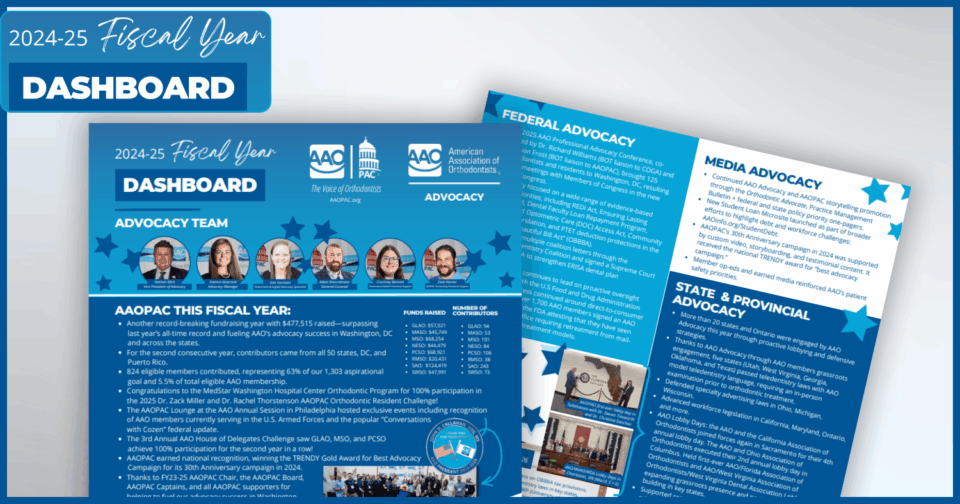Take action before December 31
Although most investors and small business owners strive to implement tax planning strategies throughout the year, there are often items that need to be considered leading up to year-end.
With potential tax policy changes coming in 2022, this process is more important than ever. Cain Watters & Associates reminds orthodontic practice owners that now is the time to pause and review your individual situation to make sure you’ve maximized your tax planning as we approach the last quarter of the year.
2021 Tax Planning Strategies
Reimburse yourself for business expenses you paid personally by year-end If you have personally paid any business expenses this year, have the business reimburse you before year-end.
- These expenses include meals, business travel expenses, auto expenses, supplies, etc.
- Entertainment expenses generally are not deductible although there are many exceptions.
- Read more on the CWA blog around what now is and is not deductible around business meals and entertainment.
As your plan permits, adjust your 401(k) Plan deferral contributions if necessary before year-end to ensure you reach the maximum statutory limits for the year
- For 2021, the 401(k) maximum limits have remained at $19,500 for those under 50 or $26,000 for those over 50 by year-end.
It’s not too late to consider and add a Defined Benefit Plan or modify the funding of your existing plan for the 2021 tax year
- Have you maximized your 401(k) Plan but are still looking for a way to save more into a tax deferred environment?
- If the paperwork is submitted by early December, most advisors will continue to set these up if it makes financial sense. In order to be effective for the calendar year, the plan documents must be signed and accounts opened by Dec. 31.
- For those with existing Defined Benefit Plans, consider funding only the normal target and save excess funding for future years.
Ensure you have funded your charitable contribution and donation goals by year-end
- Last year’s CARES Act enhanced tax incentives for making charitable contributions for the 2020 tax year and the CAA Act extended many of these provisions into 2021.
- One way to get a tax deduction for charitable contributions would be to claim an above-the-line deduction of up to $300 for charitable contributions made by individuals.
- Another major benefit is that extended through 2021, is that individuals can claim an unlimited itemized deduction for a charitable contribution, which is normally limited to 50% of adjusted gross income (AGI). In the case of corporations, the usual 10% of AGI limitation is increased to 25%.
- For individuals required to take IRA minimum distributions, you should make charitable contributions directly from your IRA to reduce gross income and ensure the best possible tax deduction.
IMPORTANT NOTE:
The potential for tax reform for 2022 could alter your typical planning of purchasing equipment, deferring income or accelerating expenses.
If your income is greater than $500,000, you may want to consider accelerating income into 2021 and pushing any planned large equipment purchases into 2022. This will allow owners in the top tax brackets to benefit from the lower rates on the income before they go up and benefit from the deductions in a higher tax bracket year. CWA expects the tax reform proposal to be finalized later in November or December of 2021.
Tax Planning Reminders
Required Minimum Distributions (RMDs)
- Ensure you have taken your RMDs by year-end, if applicable. Last year’s SECURE Act delayed the age at which individuals are required to take minimum distributions to age 72.
Safe Basis & Tax Payments
- Verify that you have sufficient taxes paid in by Dec. 31, 2021, in order to avoid paying any penalties or interest. This is referred to as “safe basis.”
- You can do this either through your payroll tax withholdings or with a fourth quarter estimated tax payment, no later than Jan. 15, 2022.
- Pay any additional state taxes due by year-end as these may be taken as a deduction on your federal tax return.
S-Corporation Health Insurance
- If you operate your business in an S-Corporation and pay for your health insurance through your business, you must report the premiums paid on your form W-2.
- While these premiums are not considered wages for employment taxes, it must be reported here in order to be deducted on the S-Corporation and the shareholder’s personal return.
Each situation is unique, however, the considerations above capture some additional planning ideas that most owners still have time to take action on.
If you’re not confident you are maximizing your tax planning opportunities, the advisors at CWA are here to help. The CWA team can review your current tax situation and help discuss opportunities to take advantage of by year-end.
Cain Watters is a Registered Investment Advisor. Cain Watters only conducts business in states where it is properly registered or is excluded from registration requirements. Registration is not an endorsement of the firm by securities regulators and does not mean the adviser has achieved a specific level of skill or ability. Request Form ADV Part 2A for a complete description of Cain Watters investment advisory services. Diversification does not ensure a profit and may not protect against loss in declining markets. Past performance is not an indicator of future results.



